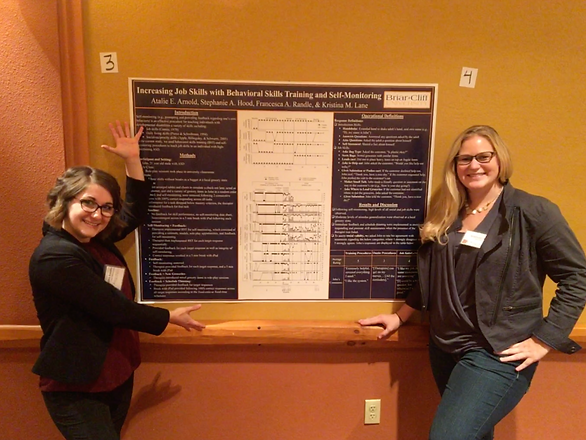
Current and Past Research
Social Skills Assessment Intervention and Learning
For prospective clients pr participants, please click the link below to email our team with any questions or to set up a meeting. You can also visit www.SSAIL.org for more information

All Videos
Dr. Stephanie Hood of Marquette University has created a video presentation to accompany her recent publication as the lead research article in the Journal of Applied Behavior Analysis (volume: 50, Issue 3, pp. 459-486): Toward meaningful outcomes in teaching conversation and greeting skills with individuals with autism spectrum disorder.
We are interested in studying the natural systems which shape and guide the processes of the natural world. Our long-term goal is to identify and characterize the scientific mechanisms specific to our principal areas of research. You can read on to find out more about these projects below.

Teaching Individuals to Identify Common Topics of Interest
Individuals with social and conversation skills deficits often have deficits discriminating vocal and nonvocal cues of interest and uninterest from their conversation partner(s). In the present study, we taught individuals to converse about preferred and less preferred topics of conversation, discriminate when the conversation partner is no longer interested in the topic of discussion, to discriminate common interests, and to end the conversation using behavioral skills training and within session corrective feedback. Stimulus generalization was assessed through conversations with two novel conversation partners in a one to one format and additional novel conversation partners in a group format. We will also discuss the social acceptability rating from the participants and the conversation partners.
Keywords: social skills, behavior analysis, intervention and learning; deficit; Behavioral skills training; common interests

Descriptive Assessment of Social Skills Across Contexts
Effective and appropriate social skills play an important role in the ability to gain and sustain employment, as well as make and maintain friendships. These skills are critical to an individual’s quality of life and likability. Given the importance of social skills, individuals with social deficits and difficulties experience significant dysfunction throughout all areas of their lives. While there are many efficacious interventions available, current literature is lacking data of the social validity of these interventions. In this study, we collected normative data of social skills exhibited by 48 neuro-typical individuals across three conversational contexts: one-on-one with a friend, one-on-one with someone unfamiliar, and in a group of four. The aims of the study were to examine how conversational context changes an individual’s social behavior, and to examine if differences among the dependent variables exist across gender, age, ethnicity, and sexual and gender identity.

Teaching Individuals to Give and Accept Compliments
Individuals with developmental disabilities such as Autism Spectrum Disorders may have conversation skill deficits, especially with accepting and giving compliments. We used an individualized approach to assess and teach accepting and giving compliments with three adolescents with developmental disabilities. We taught these skills using Behavioral Skills Training (BST; Poche, Brouwer, & Swearingen, 1981) and within-session prompting. Acquisition and maintenance of saying “Thank you” and smiling to compliments provided by the adult as well as giving compliments was observed with the trainer. Generalization and treatment extension of the skills were also observed in conversations with adults not associated with teaching. We used a multiple baseline design across participants to demonstrate experimental control over the improvements produced by our teaching procedures. The results provide initial support for an intervention in improving giving compliments within the context of a conversation.

Increasing Job Skills with Behavioral Skills Training and Self-Monitoring
Individuals with Autism Spectrum Disorders (ASD) often require explicit teaching to master a variety of social and job related skills. Previous research has demonstrated the effectiveness of self-monitoring (e.g., prompting and providing feedback regarding one’s own behaviors) to teaching individuals with developmental disabilities a variety of skills, including job skills (Connis, 1979), mathematics (Dunlap & Dunlap, 1989), daily living skills (Pierce & Schreibman, 1994), and social-reciprocity skills (Apple, Billingsley, & Schwartz, 2005). The current study used behavioral skills training (BST; Leaf et al., 2009) and self-monitoring procedures to teach job skills to an individual with high-functioning ASD. A multiple-baseline design across responses was used to demonstrate experimental control over the effects of BST and self-monitoring. Following the removal of all teacher procedures except feedback, high levels of all social and job skills were observed (e.g., skills required for a grocery bagger position; introducing oneself to strangers, providing customer service, and bagging groceries). Additionally, following teaching sessions at a university clinic, moderate levels of stimulus generalization were observed at a local grocery store. We thinned the schedule of feedback to maintain high levels of responding equal or above typical coworker performance and to promote maintenance when the therapist was not present.


